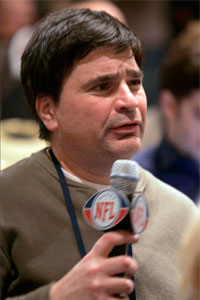Newsletter of the Milwaukee Newspaper Guild
Membership meeting
WHEN: Noon, Wednesday, March 27.
WHERE: Turner Hall
AGENDA: Cellphone policy, parking and health care will be discussed. Lunch will be served.
Fish fry set for April 18
It’s been a long gray winter — and it’s time for a party. The Guild is holding its annual spring fish fry on April 18 at Buck Bradley’s on N. Old World Third St.
It starts at 5:30 p.m., with dinner at 6 p.m. It’s open to members and a guest.
Watch for an Evite in the coming weeks and RSVP to Jan Uebelherr at janueb@aol.com.
Deal reached on cellphone reimbursement
The Milwaukee Newspaper Guild and Journal Sentinel Inc. have reached a tentative agreement to settle a grievance on cellphone stipends.
The agreement, which is pending final approval from Journal Sentinel management, would add more people to the cellphone stipend list and would increase each person’s monthly stipend.
Under the agreement, the stipend amounts for each person would be based on a three-tier system that takes into account a worker’s business usage. The tiered system was created based on feedback from members of the bargaining unit late last year in a newsroom-wide survey.
The results of the survey showed that $40 per month did not cover work usage for many bargaining unit members. This feedback ultimately led the Guild to seek reimbursement amounts that would more accurately reflect the varying amount employees were paying for business use of their cellphones. While not everyone may be satisfied with their reimbursement, this agreement would cover the most people in the fairest way possible.
Upon final approval of the settlement, Journal Sentinel management will inform employees about their new monthly amount. The stipend increases will be retroactive through October, and back pay should be distributed in the first reimbursement check.
The Guild will continue to fight for increases that reflect the increased use of smartphones and costs of cell usage.
Mobile device security
If you sync your work email to the Mail application on your iPhone or iPad, you might have noticed that the company rolled out its new security policy last month that requires all synced devices to have a four-number pass code.
This new policy, part of the Journal Communications Mobile Device Security Guidelines introduced when the company switched from the AT&T plan to the stipend plan, also gives the company the right to delete the data on your device if your phone is lost or stolen or if you are terminated.
If you do not want a pass code on your phone, or you don’t want the company to have the right to access data on your device, you must go to settings and turn off the Mail sync attached to your work account. You can continue to sync your work calendar to iCal without being required to use a pass code. You can also sync your work email to a third-party iPhone application, such as Gmail or Mailbox, without being required to use a pass code.
Incident raises night safety concerns
A Journal Sentinel employee was robbed at the corner of 4th and State streets after she ended her shift at 10:30 p.m. on Feb. 2.
Emily Hare, a part-timer in the Sports department, said she was waiting for the light to turn green so she could cross the street when a man came up behind her and took her bag, which contained her car keys. Hare was not hurt, but this incident highlights the safety issues facing people who work at night, in particular part-timers.
Full-time employees who pay about $52 monthly for a parking spot at the MATC garage and who work at night are allowed to park in the gated back lot of the Journal Sentinel building after 3 p.m. But part-timers have not been able to park in the back lot, even if their shifts start after 6 p.m. — in some cases 8 p.m., long after most of the daytime employees who use the lot have left — unless they pay the full-time rate. And in at least one person’s case, the ID badge still didn’t automatically open the gate.
However, after the incident, Marilyn Krause told Hare and Senior Sports Editor Bill Windler that part-time night employees without a spot at the MATC garage could park in the back lot for a $3 daily fee.
Those wanting to use the back lot for that fee should let the company know, and the security guard would collect the fee each time. Based on a four-day workweek, the fee would amount to $48 per month.
A related safety issue is the use of the freight entrance, which employees who park in the back lot had been using until access was removed from most ID badges. Using that entrance meant employees could go from their vehicle to the building without leaving the gated area. Krause said it was possible the access was restricted to prevent non-employees from entering the building when the back lot is used for event parking.
A door by the old MKE office also leads directly to the back lot, and some employees have been seen using it, but it has been off-limits to most newsroom employees.
So far, management has just advised people concerned about safety to leave the building in pairs or ask to be accompanied by a security guard.
Incidentally, while the theft was caught on camera, the guard did not notice it until Hare came back into the lobby and told him what had happened.
Health insurance premiums up for new plan year
Journal Sentinel Inc. full-time workers were hit with increases of 13% to 20% to their health insurance premiums when they enrolled for the plan year starting April 1. Some smokers face even higher increases.
The Guild has never had control over the premiums themselves, and in the contract signed last year Journal Sentinel Inc. adamantly insisted on removing the 35% ceiling for employee premiums.
The good news is that despite that change, the employee share of the premium rose only 1%, to an average of 24%, the company told union presidents at a meeting when the new rates were announced.
The company blamed the rate increases on the company’s higher claims history during the past 18 months as well as changes stemming from the Affordable Care Act. Those changes include more coverage for women’s health, including 100% coverage of birth control prescriptions.
Employees also will have to do only three wellness activities this year instead of four to get the full company contribution to their health savings accounts.
Ho-ho-holiday party fun
Newsroom employees and their guests gathered in December at Buck Bradley’s to celebrate the holidays and another year of good work.
[nggallery id=5]
Freelance column sparks ethics debate

From the president
Beyond its duty to advocate for Journal Sentinel newsroom employees, the Milwaukee Newspaper Guild has always been committed to promoting the highest journalism standards both within our own ranks and in the city of Milwaukee.
Often in our business, what is ethical and professional isn’t black and white, especially given the newspaper’s commitment to uncover the truth and the pressure to be the first to report it. There have been times over the years that the union and the company have disagreed about certain journalistic practices, but most often there have been open discussions about them.
Management proved to be more than willing to listen to us in February when a freelance blogger/columnist with well-documented ties to an outside interest group was used to break news. This raised considerable concern among newsroom staffers, both within our bargaining unit and among middle managers. Luckily, our editor, Marty Kaiser, was open to hearing what the Guild had to say about what we considered a potentially troublesome precedent possibly being set by allowing reporting by someone without considerable journalistic experience and with clear ties to an interest group.
We know, as Marty pointed out, that the newspaper business is struggling and our online operation must grow to make us viable in the future. Getting people to our site for breaking news is imperative to growing our online readership. But the Guild, and many of our members judging from what I’ve heard around the newsroom, has serious concerns about the can of worms we opened with the use of a freelance columnist to break news, particularly without proper representation of who he is and what potential conflict of interest there may be with him reporting the story.
In a healthy discussion with Marty, I brought up a few concerns:
- Did the source that was used to break the story have expectations that the news would be portrayed favorably in the freelancer’s column given the writer’s connections to the group he was reporting on?
- Will this set a precedent that this group can refuse to answer questions from our reporters because it can go to a like-minded columnist with the assumption the news will be portrayed favorably or no difficult questions will be asked?
- Should the columnist be able to represent himself as a Journal Sentinel reporter any time he wants when, in fact, he was hired strictly to write columns from a specific point of view?
- Is the columnist trained in seeking an alternative viewpoint and does his affiliation with an outside group make it less likely he’ll be able to access a differing viewpoint than our own reporters would?
- Would it have been better to have the columnist post his news on his own blog and run a link to it on our site?
These are all questions that should be considered if this kind of thing occurs in the future. The Guild has a responsibility to raise questions about ethical issues like this one, and we will continue to pursue more discussion with management about whether this practice should continue.
